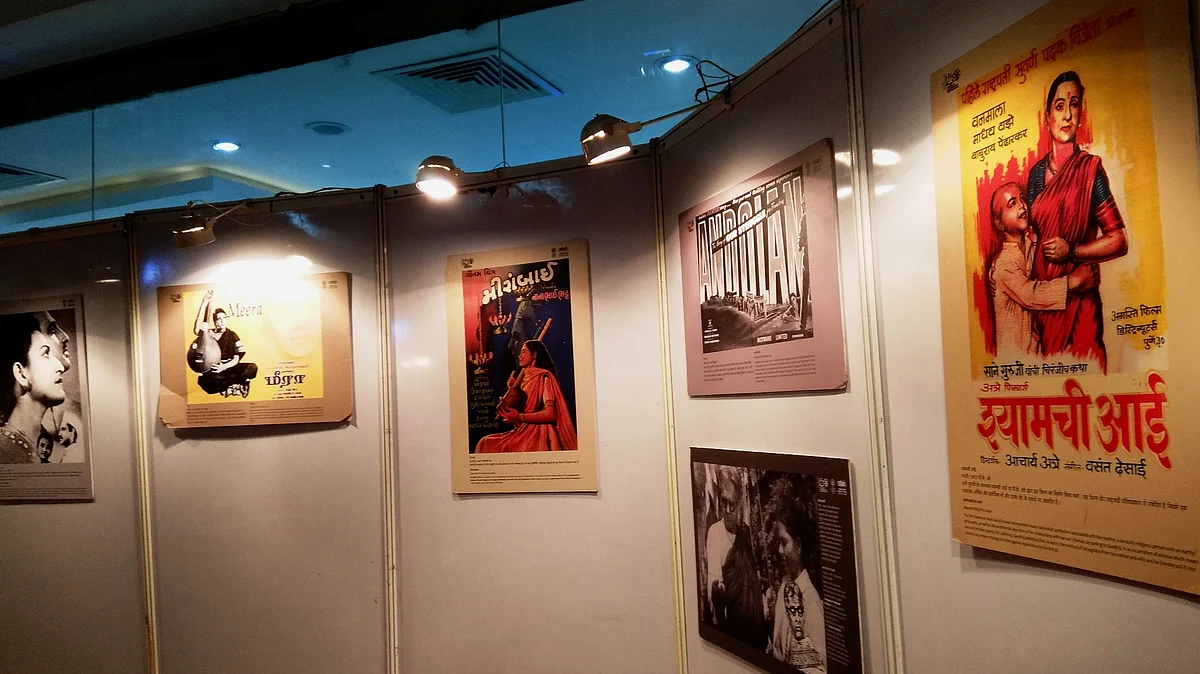5th Rajasthan International Film Festival organises ‘The Mahatma on Celluloid’ themed poster exhibition
The theme of the 5th Rajasthan International Film Festival held in Jaipur was ‘The Mahatma on Celluloid’ and it featured a special exhibition of posters and photographs depicting Mahatma Gandhi

The theme of the 5th Rajasthan International Film Festival (RIFF) held in Jaipur from 19 – 23 January 2019 was ‘The Mahatma on Celluloid’. Organised by the RIFF Film Club, the festival featured a special exhibition of posters and photographs themed on the depiction of Mahatma Gandhi and the Gandhian values and teachings portrayed on the silver screen in Indian cinema eclectically curated from the collection by the National Film Archive of India (NFAI).
The exhibition endeavored to celebrate the ideals and teachings of the Father of the Nation. As part of ‘The Mahatma on Celluloid’ theme a very important film that captured Gandhiji’s struggle for Indian Independence called Gandhi Se Mahatma Tak (1996), directed by Shyam Benegal, was also screened at the 2019 RIFF. As the title suggests, the film’s focus is on Mahatma Gandhi’s two decade long struggle against Apartheid in South Africa. The film, starring Rajit Kapur in the role of Mohandas Karamchand Gandhi, basically unfolds the crucial events that transformed a young barrister working in South Africa into a ubiquitously renowned political leader and undisputed champion of human rights.
Speaking on this year’s theme for the Rajasthan International Film Festival, Festival Director Somendra Harsh said, “The theme every year is decided by our culture department. Last year the theme was ‘Womanhood in Cinema’ and we had given the theme award to Aahana Kumra for Lipstick Under My Burkha. Since this year marks the 150th birth anniversary of Gandhiji we chose the theme ‘The Mahatma on the Celluloid for the 2019 RIFF. This year we gave the theme award to Rajit Kapur for Gandhi Se Mahatma Tak. We are grateful to the National Film Archive of India for curating the exhibition for the people of Rajasthan.”

The exhibition also featured India’s first ever film Raja Harishchandra (1913) directed by Dadasaheb Phalke and based on the legend of Harishchandra that has been described by Gandhiji as the epitome of sacrifice and selflessness. Another important Phalke film that finds a place in the NFAI exhibition is Shri Krishna Janma (1918) wherein Phalke presented an idea of the nation that closely resembles the idea of unity in diversity that the Mahatma envisioned. Another silent film that deserves a mention here is Kanjibhai Rathod’s Bhakta Vidur (1921) which brilliantly juxtaposes the character of Vidur from Mahabharat with that of Gandhiji.
A major part of Gandhiji’s struggle was spent fighting untouchability prevalent in the Indian society during the early 20th century. Franz Osten’s Achhut Kanya (1936), starring Ashok Kumar and Devika Rani, which dares to further proper Gandhiji’s crusade for social equality also finds a place in the exhibition. Indian filmmakers with strong political views operating in British India were often forced to find novel ways to fight the censorship. A fine example of this is V Damle and S Fattelal’s allegorical Marathi film Sant Tukaram (1936) which cleverly succeeds in representing Gandhiji’s political struggle against the British behind the façade of a tale of a 17th century Bhakti Saint.
V Shantaram’s Kumku (1937) with its theme of women empowerment that was central to Gandhji’s agenda of social reformation in India is another important film that finds a well-deserved place in ‘The Mahatma on Celluloid’ exhibition. Yet another important film that makes a strong case for women’s equality in Indian society is K. Subramanyam’s Tamil language film Seva Sadan (1938). The exhibition also featured Gudavalli Ramabrahmam’s Telugu film Mala Pilla (1938) about Mahatma Gandhi’s fight against untouchability.
Some of the popular Hindi films, inspired by Gandhiji’s life and teachings, featured in the NFAI exhibition include V Shantaram’s Do Ankhen Barah Haath (1957), Hrishikesh Mukherjee’s Satyakam (1969), Kamal Haasan’s Hey Ram (2000), Aziz Mirza’s Phir Bhi Dil Hai Hindustani (2000), Ashutosh Gowarikar’s Swades (2004), Jahnu Barua’s Maine Gandhi Ko Nahi Maara (2005), Rajkumar Hirani’s Lage Raho Munnabhai (2006), Feroz Khan’s Gandhi, My Father (2007), Rakesh Ranjan Kumar’s Gandhi to Hitler (2011), and Prakash Jha’s Satyagraha (2013).

Follow us on: Facebook, Twitter, Google News, Instagram
Join our official telegram channel (@nationalherald) and stay updated with the latest headlines
